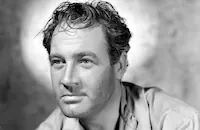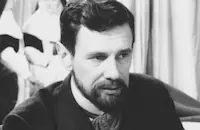Edward, My Son

Brief Synopsis
Cast & Crew
George Cukor
Spencer Tracy
Deborah Kerr
Ian Hunter
James Donald
Mervyn Johns
Film Details
Technical Specs

Synopsis
Lord Arnold Boult, a wealthy Canadian businessman living in London, addresses the audience, remarking that they may be familiar with him and his expansive empire, but for all his wealth and success he is unable to discern the reason for his son Edward's early death and wonders if the audience might be able to offer him an explanation. Boult begins his story just after the first World War, as he and his wife Evelyn celebrate Edward's first birthday with their friend and physician, Larry Woodhope.
Boult is also enthusiastic about embarking upon a promising new career in finance with Harry Simpkin, who has just been released from prison after serving time on fraud charges. Five years later, however, with the retail credit business barely thriving, Edward is diagnosed with a serious ailment that only an expensive operation abroad can remedy. Boult decides to burn down the business building to collect the insurance money to pay both for the operation and the reinvestment. Simpkin protests, but reluctantly goes along with the plan, which is successful. As Edward moves into adolescence, Boult develops into a prosperous, titled financier who is capable of buying the mortgage of the prep school that threatens to expel Edward for his reckless behavior.
A few years later, Evelyn meets with Larry to express her concern that Edward, although still young, drinks heavily and has very little sense of morality. Larry, out of love for Evelyn, advises Boult to curb Edward, but Boult scoffs at the suggestion. When Boult's old partner, Simpkin, who has again finished serving time for financial fraud, comes to Boult to plead for a job, Boult remains evasive. Despondent, Simpkin throws himself from the top of Boult's office building. Boult's secretary, Eileen Perrin, provides a cover story downplaying Boult's connection with Simpkin during the subsequent police inquiry. Shortly thereafter, Eileen and Boult become lovers. A year later during a rendezvous at Eileen's flat, the couple realize they are being watched. They invite the observer into the flat to discover he is a detective for Evelyn's attorney. Boult, outraged at Evelyn's audacity, hastily breaks up with Eileen, to avoid any further cause for a possible divorce action.
Evelyn, in Switzerland with Edward, is startled when Boult abruptly arrives and challenges her. When she declares she wants Boult ruined publicly so Edward can fully understand his father's true character, Boult counters that he knows that Larry is in love with her and that he would create a scandal that would ruin Larry. Evelyn gives in to this threat and as the years pass, sinks into bitterness and drinks for consolation. Some time later, Boult invites Larry to his office, where Larry finds out from the new secretary that Eileen killed herself after Boult's breakup with her.
Boult offhandedly admits to Larry that Edward's drinking has increased steadily and that although his son has deteriorated, he nevertheless has gotten engaged to Phyllis Mayden, who is from a socially prominent family. Boult then introduces Larry to another young woman, Betty Foxley, who has also been seeing Edward and is pregnant and believes Edward will marry her. Larry refuses to take Boult's thinnly veiled suggestion that he provide Betty with an abortion and instead offers her assistance after she declines Boult's offer of money.
A few years later during World War II, Larry visits the Boults to console them about the accidental death of Edward, who, as an RAF pilot, crashed his plane while stunting, killing the entire crew. After the war Boult, who became a widower soon after Edward's death, calls upon Larry seeking the whereabouts of Betty and her child, but Larry refuses to tell him. Boult, again addressing the audience, asks if they would have done any differently for their child and, despite the fact he has spent the last ten years jailed for burning down his business, he is determined to do whatever necessary to find Edward's child.

Director

George Cukor
Cast

Spencer Tracy

Deborah Kerr

Ian Hunter

James Donald

Mervyn Johns
Leueen Macgrath

Felix Aylmer
Walter Fitzgerald
Tilsa Page
Ernest Jay
Colin Gordon
Harriette Johns
Julian D'albie
Clement Mccallan
Crew
Sash Fisher
Harry Hassel
Tom Howard
Alfred Junge
Skeets Kelly
Edwin H. Knopf
Raymond Poulton
Sir Malcolm Sargent
Donald Ogden Stewart
The Philharmonia Orchestra
A. W. Watkins
John Woolridge
Dora Wright
F. A. Young

Photo Collections
Videos
Movie Clip



Trailer
Hosted Intro
Film Details
Technical Specs

Award Nominations
Best Actress
Articles
Edward, My Son
The story had started as a play in London, co-written by and starring Robert Morley, who was best known for comic performances. He had chilled audiences in the role, however, providing narration that links events from the child's birth through adulthood. And in a gimmick that guaranteed audience interest, he did it all with out ever showing the title character.
Director George Cukor saw the wisdom of that choice and decided to stick as close to the original as possible. The only major change was turning Tracy's character from an Englishman to a Canadian so the star would not have to adopt an accent. And though Tracy worried about tackling the unsympathetic role at first, he soon warmed to the opportunity, later confessing to Cukor that "It's rather disconcerting to me to find out how easily I play a heel."
As Tracy's drunken wife, a role that had made Peggy Ashcroft a major stage star in London, Cukor considered Tracy's frequent co-star and off-screen love, Katharine Hepburn, but the two stars were sensitive about working together too often. Then Deborah Kerr, who had come to MGM from London two years earlier, campaigned for the role.
Kerr had been a major dramatic actress in England and had recently won the New York Film Critics Award for two of her last British films, Black Narcissus (1947) and The Life and Death of Colonel Blimp (1943). After a few colorless roles at MGM, she campaigned to play Tracy's wife. The result was a powerful performance that brought Kerr her first Oscar¨ nomination for Best Actress (Tracy was nominated too, but both lost). Though her devastating drunk scenes brought praise from critics and colleagues, she got a very different reaction from her mother. "I'm sure it's very good acting, dear," she wrote in a letter to Kerr, "but I just don't like to see you like that."
Director: George Cukor
Producer: Edwin H. Knopf
Screenplay: Donald Ogden Stewart, based on the play by Noel Langley and Robert Morley
Cinematography: Freddie Young
Editor: Raymond Poulton
Art Direction: Alfred Junge
Music: Miklos Rozsa
Cast: Spencer Tracy (Arnold Boult), Deborah Kerr (Evelyn Boult), Ian Hunter (Dr. Larry Woodhope), James Donald (Bronton), Leueen MacGrath (Eileen Perrin).
BW-113m. Close captioning.
by Frank Miller

Edward, My Son
Quotes
Trivia
Notes
"Edward," the title character, is never seen onscreen. The very successful Robert Morley and Noel Langley play upon which this film was based starred Morley and actress Peggy Ashcroft in its initial London run. The play opened in New York at the Martin Beck Theater in September 1948. A September 1947 Hollywood Reporter news item notes that M-G-M paid $160,000 for the rights to the play, and that Orson Welles was initially considered for the part of "Arnold Boult." Deborah Kerr originated her role in the London stage production. Actors Ian Hunter and Leueen MacGrath enacted the same roles in the film that they had in both the London and New York productions of the play. Kerr was nominated for an Academy Award for Best Actress. Actor James Donald made his American feature-film debut in Edward, My Son.
According to information in the file on the film in the MPPA/PCA Collection at the AMPAS Library, M-G-M was pressured into adding a retribution scene to the film that did not exist in the play. The added scene had "Arnold Boult" being sent to prison for collecting insurance money by setting fire to his shop. Edward, My Son was the first of several films produced by M-G-M at its newly constructed Elstree Studios, located near London, in Borehamwood, England. Strict laws and union agreements regulating the employment of foreigners in the film industy in England usually limited the number of Americans involved in any one production. As a result, the M-G-M films shot in England were made with a primarily British crew.
According to a June 1949 Hollywood Reporter news item, M-G-M threatened legal action against the Ford Motor Company for its plans to air a television adaptation of Edward, My Son on June 13, 1949, just as the picture was set to open in New York. The Ford version, which starred Morley, McGrath, Hunter and Carol Goodner, was canceled and replaced with another show. A biography of Spencer Tracy notes that Katharine Hepburn was considered for the role played by Kerr and that Boult was changed from British to Canadian to accommodate the actor's lack of an accent. U.S. Steel Hour television adaptation of the play, directed by Norman Felton and starring Morley and Ann Todd, aired on December 7, 1955 on the CBS network. Walter Pidgeon played "Arnold Boult" and Kerr reprised her film role for an June 18, 1951 Lux Radio Theatre version of the story.
















